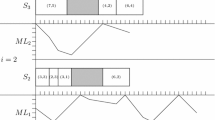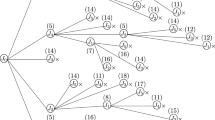Abstract
In this investigation, the single-machine scheduling problem with deterioration effects and an optional maintenance activity is explored. Deterioration effect means that the actual processing time of the job is a function of its normal processing time and its starting time. As an optional maintenance activity, the machine will perform a maintenance activity. After the maintenance activity is completed, the machine will return to the initial state, and the job deterioration will start again. The goal is to determine an optimal sequence and the location of the maintenance activity that minimizes some objective functions. We prove that the problem of minimizing the makespan, total completion time, and total absolute differences in completion (waiting) times can be solved in polynomial time \(O(n^4)\), where n is the number of jobs. For the total weighted completion time minimization, if the weights are positional-dependent weights, we prove that the problem can be solved in polynomial time; if the weights are job-dependent weights, this problem is NP-hard. To solve the problem with job-dependent weights, we present the heuristic, tabu search, and branch-and-bound algorithms.
Similar content being viewed by others
References
Bagchi, U. B. (1989). Simultaneous Minimization of mean and variation of flow-time and waiting time in single machine systems. Operations Research, 37, 118–125.
Cheng, T. C. E., Ding, Q., & Lin, B. M. T. (2004). A concise survey of scheduling with time-dependent processing times. European Journal of Operational Research, 152(1), 1–13.
Cheng, T. C. E., Tseng, S.-C., Lai, P.-J., & Lee, W.-C. (2014). Single-machine scheduling with accelerating deterioration effects. Optimization Letters, 8, 543–554.
Gawiejnowicz, S. (2008). Time-dependent scheduling. Springer.
Gawiejnowicz, S. (2020). Models and algorithms of time-dependent scheduling. Springer.
Gawiejnowicz, S. (2020). A review of four decades of time-dependent scheduling: Main results, new topics, and open problems. Journal of Scheduling, 23, 3–47.
Hardy, G. H., Littlewood, J. E., & Polya, G. (1967). Inequalities. Cambridge University Press.
Hsu, C.-J., Cheng, T. C. E., & Yang, D.-L. (2015). Unrelated parallel-machine scheduling with rate-modifying activities to minimize the total completion time. Information Sciences, 181, 4799–4803.
Huang, X., Yin, N., Liu, W.-W., & Wang, J.-B. (2020). Common due window assignment scheduling with proportional linear deterioration effects. Asia-Pacific Journal of Operational Research, 37(1), 1950031.
Ji, M., Hsu, C.-J., & Yang, D.-L. (2013). Single-machine scheduling with deteriorating jobs and aging effects under an optional maintenance activity consideration. Journal of Combinatorial Optimization, 26(3), 437–447.
Ji, P., Li, G., Huo, Y., & Wang, J.-B. (2014). Single-machine common flow allowance scheduling with job-dependent aging effects and a deteriorating maintenance activity. Optimization Letters, 8(4), 1389–1400.
Kanet, J. J. (1981). Minimizing variation of flow time in single machine systems. Management Science, 27, 1453–1459.
Lee, C.-L., & Leon, V.-J. (2001). Machine scheduling with a rate modifying activity. European Journal of Operational Research, 128(1), 119–128.
Liu, C.-L., Fan, Y., Zhao, C.-L., & Wang, J.-J. (2017). Multiple common due-dates assignment and optimal maintenance activity scheduling with linear deteriorating jobs. Journal of Industrial and Management Optimization, 13, 713–720.
Liu, F., Yang, J., & Lu, Y.-Y. (2019). Solution algorithms for single-machine group scheduling with ready times and deteriorating jobs. Engineering Optimization, 51(5), 862–874.
Lodree, J. E. J., & Geiger, C. D. (2010). A note on the optimal sequence position for a rate-modifying activity under simple linear deterioration. European Journal of Operational Research, 201(2), 644–648.
Lu, Y.-Y. (2016). Research on no-idle permutation flowshop scheduling with time-dependent learning effect and deteriorating jobs. Applied Mathematical Modelling, 40, 3447–3450.
Lu, S., Liu, X., Pei, J., Thai, M. T., & Pardalos, P. M. (2018). A hybrid ABC-TS algorithm for the unrelated parallel-batching machines scheduling problem with deteriorating jobs and maintenance activity. Applied Soft Computing, 66, 168–182.
Ma, Y., Chu, C., & Zuo, C. (2010). A survey of scheduling with deterministic machine availability constraints. Computers & Industrial Engineering, 58, 199–211.
Mor, B., & Mosheiov, G. (2015). Scheduling a deteriorating maintenance activity and due-window assignment. Computers and Operations Research, 57, 33–40.
Mosheiov, G., & Sarig, A. (2009). Scheduling a maintenance activity to minimize total weighted completion-time. Computers and Mathematics with Applications, 57(4), 619–623.
Mosheiov, G., & Sidney, J. B. (2010). Scheduling a deteriorating maintenance activity on a single machine. Journal of the Operational Research Society, 61(5), 882–887.
Pei, J., Wei, J., Liao, B., & Liu, X. (2020). Two-agent scheduling on bounded parallel-batching machines with an aging effect of job-position-dependent. Annals of Operations Research, 294, 191–223.
Rustogi, K., & Strusevich, V. A. (2014). Combining time and position dependent effects on a single machine subject to rate modifying activities. Omega, 42(1), 166–178.
Rustogi, K., & Strusevich, V. A. (2015). Single machine scheduling with time-dependent linear deterioration and rate-modifying maintenance. Journal of the Operational Research Society, 66, 500–515.
Strusevich, V. A., & Rustogi, K. (2017). Scheduling with time-changing effects and rate-modifying activities. Springer.
Sun, X.-Y., & Geng, X.-N. (2019). Single machine scheduling with deteriorating effects and machine maintenance. International Journal of Production Research, 57(10), 3186–3199.
Wang, J.-B., & Li, L. (2018). Machine scheduling with deteriorating jobs and modifying maintenance activities. The Computer Journal, 61, 47–53.
Wang, J.-B., & Liang, X.-X. (2019). Group scheduling with deteriorating jobs and allotted resource under limited resource availability constraint. Engineering Optimization, 51(2), 231–246.
Wang, J.-B., & Wang, M.-Z. (2012). Single-machine scheduling with nonlinear deterioration. Optimization Letters, 6, 87–98.
Wang, J.-B., & Wang, M.-Z. (2013). Minimizing makespan in three-machine flow shops with deteriorating jobs. Computers and Operations Research, 40(2), 547–557.
Wang, J.-B., & Wang, J.-J. (2014). Single machine group scheduling with time dependent processing times and ready times. Information Sciences, 275, 226–231.
Wang, J.-B., & Wang, J.-J. (2015). Single-machine scheduling problems with precedence constraints and simple linear deterioration. Applied Mathematical Modelling, 39, 1172–1182.
Wang, J.-B., & Wei, C.-M. (2011). Parallel machine scheduling with a deteriorating maintenance activity and total absolute differences penalties. Applied Mathematics and Computation, 177, 8093–8099.
Wang, Z., Wei, C., & Wu, Y.-B. (2016). Single machine two-agent scheduling with deteriorating jobs. Asia-Pacific Journal of Operational Research, 33(5), 1650034.
Wu, C.-C., Wu, W.-H., Wu, W.-H., Hsu, P.-H., Yin, Y., & Xu, J. (2014). A single-machine scheduling with a truncated linear deterioration and ready times. Information Sciences, 256, 109–125.
Xiong, X., Wang, D., Cheng, T. C. E., Wu, C., & Yin, Y. (2018). Single-machine scheduling and common due date assignment with potential machine disruption. International Journal of Production Research, 56(3), 1345–1360.
Xu, K., Feng, Z., & Jun, K. (2010). A tabu-search algorithm for scheduling jobs with controllable processing times on a single machine to meet due-dates. Computers & Operations Research, 37, 1924–1938.
Yang, S.-J., & Yang, D.-L. (2010). Minimizing the total completion time in single-machine scheduling with aging/deteriorating effects and deteriorating maintenance activities. Computers & Mathematics with Applications, 60(7), 2161–2169.
Yin, Y., Cheng, T. C. E., Wan, L., Wu, C.-C., & Liu, J. (2015). Two-agent single-machine scheduling with deteriorating jobs. Computers and Industrial Engineering, 81, 177–185.
Yu, S. (2015). An optimal single-machine scheduling with linear deterioration rate and rate-modifying activities. Journal of Combinatorial Optimization, 30, 242–252.
Zhang, X., Lin, W.-C., Wu, W.-H., & Wu, C.-C. (2017). Single-machine common/slack due window assignment problems with linear decreasing processing times. Engineering Optimization, 49(8), 1388–1400.
Zhang, X., Wu, W.-H., Lin, W.-C., & Wu, C.-C. (2018). Machine scheduling problems under deteriorating effects and deteriorating rate-modifying activities. Journal of the Operational Research Society, 69(3), 439–448.
Zhu, Z., Liu, M., Chu, C., & Li, J. (2019). Multitasking scheduling with multiple rate-modifying activities. International Transactions in Operational Research, 26(5), 1956–1976.
Zhu, Z., Zheng, F., & Chu, C. (2017). Multitasking scheduling problems with a rate-modifying activity. International Journal of Production Research, 55(1), 296–312.
Acknowledgements
This work was supported by the National Natural Science Foundation of China (71971165), the National Key Research and Development Program of China (2021YFB3301801), the MOE Project of Humanities and Social Science of China (19YJE630002), and the Soft Science Research Program of Shaanxi (2018KRZ005).
Author information
Authors and Affiliations
Corresponding authors
Additional information
Publisher's Note
Springer Nature remains neutral with regard to jurisdictional claims in published maps and institutional affiliations.
Rights and permissions
Springer Nature or its licensor holds exclusive rights to this article under a publishing agreement with the author(s) or other rightsholder(s); author self-archiving of the accepted manuscript version of this article is solely governed by the terms of such publishing agreement and applicable law.
About this article
Cite this article
Sun, X., Liu, T., Geng, XN. et al. Optimization of scheduling problems with deterioration effects and an optional maintenance activity. J Sched 26, 251–266 (2023). https://doi.org/10.1007/s10951-022-00756-4
Accepted:
Published:
Issue Date:
DOI: https://doi.org/10.1007/s10951-022-00756-4




